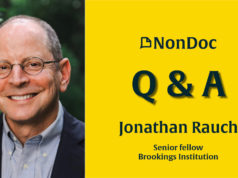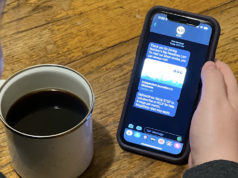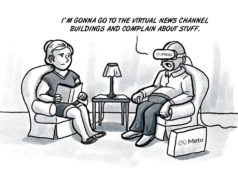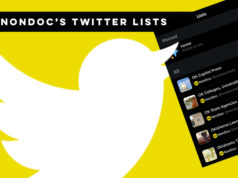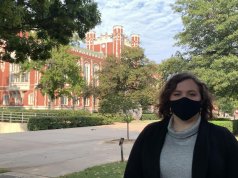

TISHOMINGO — After reading a NonDoc article of mine in 2017, Oklahoma Poet Laureate Jeanetta Calhoun Mish posted on her personal Facebook page that she wanted to meet me. A mutual friend tagged me in the post, and a Facebook friendship emerged over the course of that year.
In April, Mish visited my hometown of Tishomingo and performed a poetry reading at the Johnston County Library. She also led a workshop with the junior-high English students at Milburn High School.
The following conversation about Facebook took place April 11 during that visit.
Tiara Blue: Let’s talk about why we’re here together today: Facebook.
Jeanetta Calhoun Mish: I reached out to you. Once I knew when I’d be in town, I offered to visit the schools for free, if they were interested. I just needed a place to stay.
TB: And I reached out to a couple of friends via Facebook. Lisa Rose — she owns Spa211 on Main Street — she offered a free massage prior to the poetry reading for [Murray State College]. And I’d seen on Facebook that Vicki and Luther (Harbert) had built a beautiful cabin (Cedar and Stone Bed and Breakfast), so I reached out to her. I told her what you were doing for our schools, and that we needed lodging. And she said, “Have her come to my place!”
Vicki Harbert: And now we’re eating breakfast together.
JCM: In your lovely home … over some of the best biscuits and gravy I have ever had! (Laughter)
TB: So we can honestly say, without Facebook, we wouldn’t be sitting across from each other eating breakfast. Facebook presents itself as this medium where we can connect with family and friends, and in your case, fans —
JCM: Mmm-hmm. (chuckles) As new friends!
TB: — at no cost to ourselves. So my question is: Do you think Facebook is truly free?
JCM: No. Very little in life is truly free. We all give up something for something. In this case, data. For me, the benefits — as of right now — still outweigh the difficulties. For one thing, Facebook is not the only company collecting data on us. If you use your credit card and buy something online, suddenly you’ll notice on Safari, you’ll get ads from that one company. I do tend to use my private browser settings when I’m buying things online just because I think it’s a little bit better for taking care of my credit card information.
But, as for the benefits, my patterns of friendship have exploded because of Facebook. You know you can do Twitter or Instagram or send someone an email, but the process of finding someone, like I found you — I found a voice from Oklahoma that I respected — I would have never found you so easily otherwise. So for me, especially with the personal-versus-public presentations, the benefits still outweigh the costs.
TB: Did any of you wake up to that message that says you’re one of 87 million whose data was taken? It was at the top of my news feed. I have a screenshot right here. It says one of my friends accessed this app, and my data was taken as a result.
VH: I got that message too. I honestly believe that when we get down to it, everyone’s data probably has been taken. I truly believe that.
JCM: I can’t imagine that they would go through it with a fine-tooth comb. What was that social medium site that all the bands used to use?
TB: MySpace?
JCM: Yes, I think we’re kidding ourselves if we think MySpace didn’t do the same thing. It’s the only way they can monetize these sites. People can’t run huge server banks for nothing, and if their service is free, the money has to come from somewhere. I think it’s been happening a lot longer than people like to admit, but I also think that Facebook is a really good target for our anger because its market branding is kind of insufferable. (Laughter)
Be sure to follow NonDoc:
Is it time to delete Facebook?
TB: As you might know, Mark Zuckerberg has met with Congress to discuss protections for user information, or the lack thereof. I know on Twitter, #deleteFacebook has gained some traction. What do you think?
JCM: I think it’s up to each individual to decide where his or her limit is. You want to shut down Facebook? That’s fine if that’s where your limit is. It does feel — this particular last round of selling people’s information seems a little creepy — maybe a little creepier than usual because of the profiling.
But I’m not sure #deleteFacebook is the answer. In my case, the benefits that come from my author page and personal page are working for me, because the information I share is already out there anyway. I get to keep up with my cousin’s kids, my cousin I haven’t seen in years.
I actually started a relationship with my father’s youngest sister — she found me on Facebook. I went to Broken Arrow a couple of years ago and spent the weekend with her, and I got to learn more about my father’s side of the family. Should I be worried? I think I’d be more worried if it was the government rather than corporate.
VH: For a small, rural community like we live in, Facebook is a huge, easy way to market that cabin on our ranch, and that’s how other people from other states have found us, and so I don’t see us deleting it at all.
TB: I think for me I’m coming from a conflicted place because I use Facebook for both work and to share stories as a mother. We own storage units, and we sell lawn mowers, so as a businesswomen, I’ve seen the value of FB. But as a mother, I feel uneasy. Especially after I saw that 4Channel video where Mark Turnbull bragged about having all this data on FB and using it to create psychological profiles to manipulate people’s behavior.
I don’t like the idea of someone creating a psychological profile on me. Then I got to thinking: I’ve documented stories about my boys since they were born. What’s to stop these companies from creating a psychological profile on my own children? So, I’ve found myself posting less and less about my family since the news broke. And I used to love to share stories about my boys: funny things they said, sad things that happened in our lives, accomplishments. Facebook was a place where I could chronicle our memories and look back on those memories. And now, I guess I’m just going to put those stories in Notes, or something. (Laughs) Because I don’t feel comfortable.
JCM: Yes, if I had little ones, I’d be concerned about that, too. My 27-year-old has a Facebook page. However, my husband does not have a Facebook presence at all. You could search my whole page. You won’t find his first name. I rarely mention him because I am honoring his choice to not be on Facebook.
VH: Luther doesn’t either. He sells registered Angus bulls, so I tried to get him to create a page about his bulls. He doesn’t mess with it. He doesn’t mind it. He likes to read the stories, and he logs in on mine — which is weird, because on his phone, my news feed is completely different than on my phone. Now, how’s that?
TB: An algorithm, maybe?
JCH: They often switch things around.
VH: And I’ve often wondered, until now, how I could look at something on Amazon, and all the sudden the ads for it popped up on my feed. I just thought it was a strange coincidence! (Laughs)
TB: I’ve read that if you’re logged into your app, Facebook can see everything that’s on your browser. Even if you log out of your app, but happen to still be logged into Safari, they can still see everything. You have to log out of Facebook and everything on your device, or it will continue to monitor you.

Is #deleteFacebook a form of privilege?
TB: Some people would argue that the fact that we can even talk about deleting Facebook is a form of privilege in itself. Academics point out dissidents in authoritarian regimes who use Facebook to talk about government abuses. Another thing that comes to mind is the Oklahoma teachers’ walkout. Much of the organizing for the walkout took place through Facebook. The ladies in black, the attorneys that marched for teachers, I think they said they came together and organized through a Facebook group page. So what do you think? Is it a privilege to consider even deleting Facebook?
JCM: I think it really comes down to the fact that Facebook has become kind of indispensable.
VH: It’s an invaluable tool.
JCM: I will say when it comes to the concept of “Facebook privilege,” I have a really good friend — well, a really good friend that I’ve never met — and she’s physically disabled. She’s talked a lot about how it’s made her feel a more full person. First of all, she can connect to people, but also, she doesn’t have to depend on people to come to her. And now that she feels better, she has this huge network of people that she can reach out to when she needs them.
TB: Facebook has been an equalizer for me, too. I’m bilaterally deaf, about 50 percent in both ears. And when I’m out and about in the “real world,” it’s almost exhausting. I hear maybe one of every three words. The other two words are muted, and so, I’m looking at people’s body language — their facial reactions — and I’m trying to determine inflection and tone. So if somebody speaks at a frequency outside my hearing range, or if their body language contradicts their tone of voice or their actual words, then my reactions may not be appropriate. And that makes people — and me — uncomfortable. Whereas, on Facebook, conversations are cut-and-dry. I see the words, and I respond.
TB: What do you think an ideal Facebook would look like? What parameters do we need to make it safer, and if those parameters are in place, could Facebook still have a successful business model?
JCM: I think it’s impossible to do both, as long as Facebook is free. Now, if it is was something we paid for each month, then maybe. But they have to monetize it somehow, and as long as it’s “free,” I don’t think it’s possible. All the things we use that are “free,” there’s always a cost. And the question is, is it a cost you can live with?










